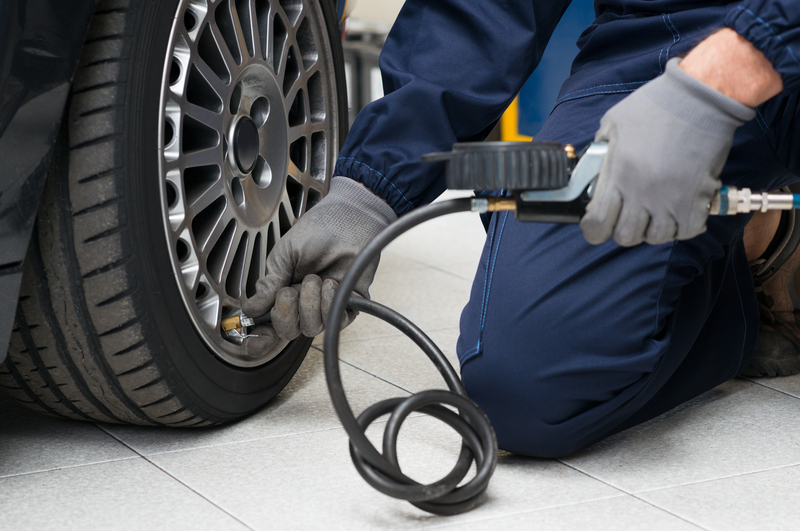Tips for a Smooth and Stress-Free House Move
Posted on 23/06/2025
Tips for a Smooth and Stress-Free House Move
Are you preparing for a house move? If so, you're not alone. Every year, millions of people relocate to new homes, and while moving to a new house can be an exciting chapter, it's also famously stressful. However, with the right guidance, your upcoming house move can be smooth and surprisingly stress-free. In this comprehensive guide, we share expert tips, proven strategies, and valuable insights to help make your house moving process well-organized and hassle-free.
Why Is It Important to Plan for a Smooth and Stress-Free House Move?
Moving house involves much more than packing boxes and hiring a moving van. Without proper planning, it's easy to feel overwhelmed and risk running into costly or time-consuming issues. Key reasons to aim for a well-organized move include:
- Minimizing Stress: Staying organized reduces uncertainty and anxiety.
- Preventing Damage & Loss: Well-planned moves safeguard your possessions.
- Saving Money: Avoiding last-minute problems helps you stay within budget.
- Saving Time: Efficient scheduling prevents delays and helps you settle in quickly.
In this article, we cover essential tips and solutions to help you achieve the smooth and stress-free house move you deserve.

Preparation: The Foundation of a Stress-Free Move
1. Start Early and Create a Timeline
The secret to a successful and easy house move is beginning preparations early. As soon as you know your moving date, create a timeline outlining all major tasks and deadlines.
- Six to Eight Weeks Before Moving: Declutter, research moving companies, and notify landlords or real estate agents.
- Four Weeks Before Moving: Begin packing non-essentials, arrange utilities for your new home, and gather packing materials.
- Two Weeks Before Moving: Pack most belongings, confirm moving arrangements, and change your address with postal services and banks.
- One Week and Moving Day: Pack an essentials bag, defrost your fridge, and finish packing last-minute items.
2. Declutter and Downsize for a Fresh Start
One of the most important stress-free moving tips is to declutter before you pack. Moving is the perfect opportunity to sort through your belongings and get rid of items you no longer use or need. Donate, sell, or recycle items to lighten your load and start fresh in your new home.
3. Research and Hire the Right Moving Service
Another essential tip for a smooth house removal is to hire trustworthy movers. Research local moving companies, read reviews, and compare quotes. Decide between full-service movers (who pack, move, and unpack everything) and self-move options (such as van rentals for DIY moves).
Remember, booking movers early gets you the best rates and ensures availability on your chosen date.
4. Keep Important Documents Accessible
Gather all relevant documents, such as contracts, identification, inventory lists, and utility bills, and store them in a secure, easily accessible folder. This will help prevent mishaps or delays during your move.
Packing Strategies for a Seamless House Move
5. Gather Quality Packing Materials
For an efficient and safe move, you will need sturdy materials, including:
- Cardboard boxes in various sizes
- Bubble wrap and packing paper for fragile items
- Packing tape and markers for labeling
- Plastic wrap for securing draws and open containers
Tip: Collect boxes from supermarkets, friends, or purchase specialty moving boxes for extra protection.
6. Label Boxes Clearly
Label each box with its contents and the room it belongs to. Consider using color-coded labels or markers for each room to streamline unpacking. Detailing "fragile" or "this way up" can also prevent breakages and mishandling.
7. Pack Room by Room
Pack one room at a time, starting with areas you use the least. This keeps your house organized and prevents essential items from being packed away too early.
8. Protect Fragile and Valuable Items
- Wrap plates and glassware individually in bubble wrap or paper.
- Use towels or linens as extra cushioning for delicate objects.
- Consider packing fragile items in your personal vehicle if possible.
9. Don't Overpack Boxes
Heavy boxes are not only harder to move but more likely to break apart or cause injuries. Keep boxes under 20 kilograms (about 44 pounds) where possible and distribute the weight evenly.
Planning for the Moving Day
10. Create a Moving Day Checklist
List all the essential tasks to be completed on moving day:
- Supervise movers and provide clear directions
- Check every room, cupboard, and storage space
- Secure your old home (lock doors, windows, hand over keys)
- Hand in or collect keys as required
- Keep important documents, valuables, and an essentials box with you
11. Pack an Essentials Box
The essentials box is a lifesaver for a stress-free relocation. It might include:
- Toiletries and medications
- Snacks and water
- Basic tools (screwdriver, scissors, tape)
- Phone chargers, laptops, and spare batteries
- Clean bedding and towels
- Personal documents and keys
Keep this box accessible until the last minute and open it first at your new home.
12. Communicate with Movers
On moving day, clearly explain your expectations and walk the movers through both your old and new homes. Point out fragile or heavy items, and clarify parking arrangements and access points. The better the communication, the smoother the house move will be.
Setting Into Your New Home Smoothly
13. Inspect Your New Property First
Before movers unload, quickly inspect your new home for any issues such as leaks, broken fixtures, or missing utility connections. Take photos if you're renting and report anything that's amiss to the property manager.
14. Direct Boxes to the Right Rooms
As movers bring items in, direct boxes and furniture to their respective rooms. This helps keep the home tidy and streamlines the unpacking process.
15. Unpack Essentials First
Tackle priority rooms like the kitchen, bathroom, and bedrooms before moving onto less essential areas. Setting up a functional space will help you settle in comfortably.
16. Check Belongings for Damage or Missing Items
Compare your move-in inventory with delivered items. If anything is damaged or missing, report it to the movers immediately to resolve potential insurance claims.
Bonus Tips: Keeping Your House Move Stress-Free
17. Arrange Child and Pet Care
If you have young children or pets, it's a good idea to arrange for them to stay with friends or family during the move. This keeps them safe and makes it easier for you to focus on the move.
18. Set Up Utilities and Services in Advance
To ensure a smooth transition into your new home, arrange for electricity, water, gas, and internet connection to be transferred or set up in advance. Don't forget to change your address with the bank, doctors, subscription services, and workplace.
19. Take Care of Yourself
Staying healthy and energized is key to a stress-free house moving experience. Remember to eat well, stay hydrated, and get enough sleep before and after your move.
20. Involve Your New Neighbors
Introduce yourself to neighbors early. A friendly hello can help you settle into the community and may come in handy if you need local recommendations or a helping hand.
Common House Move Mistakes to Avoid
- Leaving packing to the last minute
- Forgetting to book removal services
- Not labeling boxes properly
- Overestimating your DIY moving abilities
- Ignoring insurance for possessions
- Overpacking and causing injuries or box breakages
- Failing to prepare a moving essentials kit
Avoiding these pitfalls will help guarantee a smooth and stress-free house move.

Frequently Asked Questions About Moving House Stress-Free
How far in advance should I start preparing for my move?
Ideally, begin preparing for your house move at least 6-8 weeks before your moving date. This gives you enough time to declutter, pack, book moving services, and handle paperwork without feeling rushed.
What if I have a last-minute move?
If you need to move house on short notice, prioritize packing essentials and valuables, enlist help from friends or professional packers, and use checklists to stay on top of urgent tasks. Stay calm--focusing on the big items first will make a significant difference in reducing stress.
Should I hire a moving company or do it myself?
This depends on your budget, the amount of furniture, and how far you're moving. A reputable moving company can significantly reduce stress, but if you're relocating locally and have minimal belongings, a DIY move may be more cost-effective.
How do I prevent loss or damage to my items?
Pack items carefully using quality materials, label fragile items, and maintain a detailed inventory. Hiring insured and experienced movers adds an extra layer of protection for a trouble-free move.
Final Thoughts: Make Your Next Move the Best Ever
While moving house may never be completely free of stress, following these expert house moving tips will dramatically increase your chances of a smooth, seamless, and stress-free relocation. With early preparation, organized packing, the right support, and self-care, your move can be efficient, effective, and even enjoyable.
Ready for your next chapter? Use these tips for a smooth and stress-free house move and turn your big transition into a positive milestone in your life!
- Plan early for a stress-free house move
- Declutter for an easier and lighter relocation
- Use professional services for safe and efficient transport
- Take care of practical details for a seamless start in your new home
If you've found these tips useful, be sure to share this article with friends and family embarking on their own moves--and welcome to your new home!
Latest Posts
Tips for a Smooth and Stress-Free House Move
Conquer Clutter: Smart Strategies for Relocation
Efficient Ways to Relocate Your Mattress and Bed



